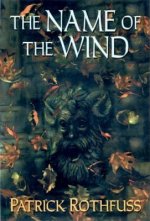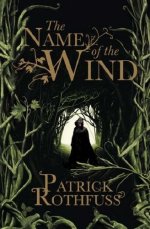
| The Name of the Wind (The Kingkiller Chronicles: Day One) | |||||||||
| Patrick Rothfuss | |||||||||
| DAW / Gollancz, 904 / 661 pages | |||||||||
|
A review by Dustin Kenall
Last year, many readers were invited to an if not never-ending banquet then at least a hearty three-course meal of a trilogy
called The Kingkiller Chronicles by debut novelist Patrick Rothfuss. Critics lauded the first
book, The Name of the Wind, as "intricate and wondrous," the work of "a new giant," and even "the best fantasy novel
of the past 10 years." The latter encomium seems willfully disputatious, given recent outstanding inventions such as K.J.
Bishop's The Etched City, Susanna Clarke's Jonathan Strange and Mr. Norrell, Philip Pullman's His
Dark Materials, and Jonathan Stroud's Bartimaeus Trilogy, as well as ongoing works by Robin Hobb
and George R.R. Martin. Nonetheless, the work is an achievement, especially from a first-time writer. The true measure of
its worth, however, lies in the promise of things yet to come from Rothfuss, a budding journeyman with the potential of
becoming a master storyteller.
At the center of the trilogy stands Kvothe. At different times an orphan, a lutist, a student, a mage, and a dragon slayer,
at the opening of his tale Kvothe is only Kote, a simple innkeeper who has renounced his adventurous ways and heroic
persona. Rothfuss shows us, in a prologue that is about as perfectly polished as one page of prose can get, the layered
silence that envelops him, "the patient, cut-flower sound of a man who is waiting to die." There are demons -- monsters
equal parts spider, lobster, and Edward Scissorhands -- about and, unsurprisingly, it appears Kvothe's past is catching up
with him. A scrivener tracks him down to take his life story. Kvothe demands three days - one for each book - as opposed
to 101 nights to tell his tale. Then he begins the story of his life of which (unlike that indecisive narrator David
Copperfield) he knows he is the hero.
Kvothe's exploits begin promisingly enough as a child prodigy of the "Ruh," itinerant performers marrying the infamy of gypsies
with the talent of the theater troupe from Hamlet. Problematically, the nameless world these characters inhabit creaks with
the Potemkin Village verisimilitude of an off-the-rack medieval Western European fantasy. Unexplained anachronisms
intermittently pop up. In a pre-scientific culture, one wonders how a physician could subscribe not only to the precaution
of washing hands but also to the concept of microscopic germs. Likewise, the author introduces a distinction between
alchemy and chemistry that he never elaborates. Thus, Publishers Weekly hits the mark in observing that the
novel's "originality... lies less in its unnamed imaginary world than in its precise execution."
Rothfuss eschews world building for character focus, a defensible strategy if you have an appealing character. Unfortunately,
Kvothe is too good, suffering from the Superman syndrome: the flaw of flawlessness. He starts out as a boy genius with
all the charm of Wesley Crusher from Star Trek: The Next Generation. As an innkeeper in his mid-twenties he
has grown, but only into an echo of a David Gemmell character, wont to utter such ponderous epigrams as "Bones mend. Regret
stays with you forever" and "I've told... hard lies and harder truths." Elsewhere, the careful reader will be sure to find
Kvothe dropping lapidary gems, such as when (commenting on conflicting feelings) he enlightens: "Emotions by their very
nature are not reasonable things." And then there is his repartee with other characters, evinced by the exchange:
"I am not many people."
Yet Rothfuss is not without considerable resources as a storyteller. When he spins myth, as in the legend of a fallen hero, it
comes out hard as iron, bright as gold. While Kvothe is not as deep as he'd have you believe, he is clever, as evinced by his
sardonic aside: "[M]y Arcanum bunkmates taught me a card game... I returned the favor by giving an impromptu lesson in
psychology, probability, and manual dexterity. I won almost two whole talents before they stopped inviting me back." One is
particularly grateful for Rothfuss's brevity. His chapters are short, his scenes as crisp and neat as hospital bed
corners. This is no small talent; it keeps his narrative vital and the reader fresh. It also complements nicely his habit
of anticipating the reader's plot expectations based on genre conventions, only to suddenly subvert them.
Turning to substance, Rothfuss creates a fresh and plausible magic system. If an electrician, a physicist, and a druid were
locked in a room together, they might come up with something like arcanism. His magic relies, like the best, on indirection
coupled with technical exactitude. When employed, it has a MacGyver-esque quality of improvisation that is pure delight. And
I couldn't possibly forget to mention his singular contribution to the world's bestiary of imaginary creatures: the
"cow-lizard." Rather than modeling his dragon off a regal lion, a predatory cat, or a loyal canine -- tired clichés one
and all -- Rothfuss presents us with a hippopotamus of the forest that chomps trees like celery stalks and rolls over
coals like a pig in dirt. The dragon has a starring role for only a few pages, but it steals the show and by itself is
worth the price of admission.
Finally, a sense of joyousness now and again sneaks up and grabs the reader, especially in the proliferation of fascinating
side characters. There is Manet, the student in no particular rush to graduate, counting his schooling in decades rather
than semesters; Devi, the loan shark played (in a delightfully Whedon-esque way) against type and all the more scary for
it; and one instance when Kvothe and a stranger take delight in the surprise of each other's good nature amidst a landscape
of moral turpitude and apathy. Both having arrived at a better place than where they started from, they connect:
He broke into a huge smile and handed back the penny. "With such nice compliments, you come back any time."
Dustin Kenall is a lawyer working and blogging in DC. Accordingly, if at any given moment he's not reading or writing, it's probably because he's unconscious. His blog, readslikealawyer.blogspot.com, is always wide awake, though. |
||||||||
|
|
If you find any errors, typos or anything else worth mentioning,
please send it to editor@sfsite.com.
Copyright © 1996-2014 SF Site All Rights Reserved Worldwide

